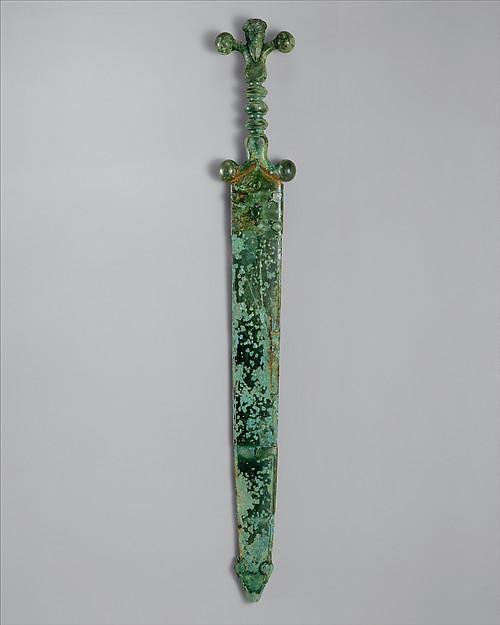What I want to talk about here is how I'm handling some of the magic items in the game and how that interacts with the environment of Mythic Ireland.
Magic weapons! They're real!
One thing I had to clear up with my group was the idea that our game was going to be a low-magic setting. For one, if you read Irish folklore, it's not a low-magic environment. Magic abounds. Magical events happen. People do superhuman things.
And magical items actually abound.
Check out this sword, below. It's a weapon of Celtic origin, from 60 B.C. According to the Metropolitan Museum of Art:
The human form of the hilt—appearing as a geometric reduction of a classical warrior—must have been intended to enhance the power of the owner and to bear a talismanic significance.
So, there you have it - a magical sword. Items like this one and others like it were often crafted with details that were supposed to bring "luck" or "blessings in battle" to the wielder. The difference is, in societies with magical realism, a good luck charm isn't like a rabbit's foot, which we might carry with us to make us feel better. A lucky charm was considered to be the real thing.
So, right off of the bat, I intended for the campaign to feature things like this - magical items as part of everyday life. But juxtaposed with that would be the sense that even though these things were all around, they would never be treated as something mundane.
To also help with the idea of magical items, I'm putting in the idea of player characters self-enchanting items that they wield. The idea behind this is that in the hands of normal man, a bow is just a bow. But in the hands of Odysseus, a bow is a remarkable weapon capable of great feats.
So, just by picking up a weapon, a powerful warrior in my game can make a sword...a +1 sword. If he is truly worthy and capable, he might be able to make it a +1 thundering sword. Etc.
What determines the sorts of enchantments a person can put on an item? Enech. A word that means both honor and glory in ancient Ireland. A warrior was taught to constantly seek enech in his society, continually proving himself and his worth. Throughout our campaign, characters can seek out enech by accomplishing particular deeds.
Here are some examples:
- Rallying a group of people +3
- An act of exceptional bravery +1 to 5
- An act of exceptional cleverness +1 to 5
- Making a sacred oath +1 to 5
- Offering to take up a difficult quest for a noble or king +3 or +5
- Avenging the murder of a kinsman +5
- An exceptional performance before a noble audience +5
- Becoming renowned with a particular weapon +5
- Defeating an opponent in a duel +5
- Proving oneself as a good Christian +5
- Warrior class +5
- Acting as an intercessor with the Sidhe +10
- Bard, Barbarian, or Ranger class +10
- Becoming renowned as a good advisor +10
Here are some ways to lose enech as well:
- Breaking a sacred oath -30
- Angering the Sidhe -30
- Long-term tampering with dark powers -20
- Breaking one’s word -20
- Kin-slaying -20
- Arcane caster -10
- Associating with blasphemers -10
- Caught in a lie -10
- Failing in a quest -10
- Getting cursed -10
- Kinless -10
- Leading a profligate lifestyle -10
- Proving unable to fulfill a sacred oath -10
- Twisting the meaning of an oath -10
As characters progress in the campaign, they will have (and have had) opportunities to enhance their enech. As they do, they gain the ability to bestow items they pick up with magical power. Of course, as soon as these items leave their possession, they are no longer empowered.
Here are some examples of 30 point gifts.
- Make one weapon +1
- Make one weapon keen
- Make your water skin produce a potion of cure light wounds 3/day
- Luck - you can re-roll 1 skill check a day
- Blessing - you gain +1 Hero Points per level
Additional gifts can be gained for more points at 50 and 70 points. Each time a character gains a level, he can redistribute his enech gifts if he wishes.
Anyhow, this little addition has really worked for us. I hope you all can use this for your own games!

I like your campaign setting idea. First off it's rare to do low magic settings. Most players want to be able to fling spells like they do arrows. And having a rare magic item actually DO stuff as apposed to bumping your attack value makes it all the more worth it.
ReplyDeleteDon't get me wrong, i love dnd 4e, but admittedly Pathfinder allows you to pull this stuff off really well and handles it better.
Interesting that you should say that. It's actually not a low magic campaign, because it's set in a mythic environment. In mythic environments, you have characters that can lift trees out of the ground, change shape, and control the weather.
ReplyDeleteBut you do illustrate the issue of doing something like this. As soon as people hear "historical" or something from the real world like "Ireland", they also typically think "low magic".
Well he DID say in the above post: "One thing I had to clear up with my group was the idea that our game was going to be a low-magic setting."
ReplyDeleteI guess that's where i got it.
Regardless i really do like the feel of it. Ancient mythic celtic has some cool aesthetics imo.
Right. I totally can see where that could have been mis-read. My bad for writing something with unclear grammar.
ReplyDelete